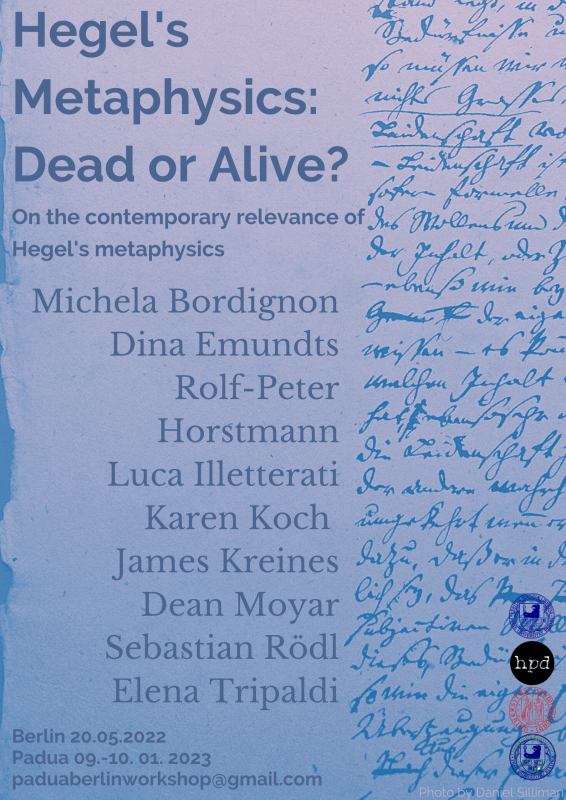We are glad to give notice of the second meeting of the International Workshop Hegel’s Metaphysics: Dead or Alive? On the contemporary relevance of Hegel’s metaphysics, which will find place in Padua, on January 9th-10th, 2023 (Sala delle edicole, Palazzo del Capitanio, Piazza Capitaniato, 3).
Following up on the first meeting held in Berlin (May 20th, 2022), which hosted talks by Luca Illetterati, James Kreines, Dean Moyar, and Elena Tripaldi, the second meeting will take place in Padua and it will be held in German and English. Speakers will be Michela Bordignon (Universidade Federal do ABC), Dina Emundts (Freie Universität Berlin), Rolf-Peter Horstmann (Humboldt Universität zu Berlin), Karen Koch (Freie Universität Berlin), Sebastian Rödl (Universität Leipzig).
It will be possible to attend in person or via zoom (for both in-person and zoom attendance, please register at paduaberlinworkshop@gmail.com)
The workshop is organized by Karen Koch (Freie Universität Berlin) and Elena Tripaldi (Università degli Studi di Padova/Freie Universität Berlin), and it is realized thanks to the sponsorship of the chairs of Theoretical Philosophy at the Università degli Studi di Padova, Luca Illetterati, and of History of Philosophy at the Freie Universität Berlin, Dina Emundts.
Andrea Altobrando, Giulia Bernard, Valentina Bortolami, Francesco Campana, Claudia Cavaliere, Luca Corti, Eleonora Cugini, Davide Dalla Rosa, Laura Dequal, Alessandro Esposito, Marco Ferrari, Saša Hrnjez, Zdravko Kobe, Giulia La Rocca, Silvia Locatelli, Giovanna Luciano, Armando Manchisi, Mattia Megli, Francesca Menegoni, Giovanna Miolli, Dean Moyar, Elena Nardelli, Antonio Nunziante, Filippo Sanguettoli, Barbara Santini, Niccolò Sbolci, Gabriele Tomasi and Annapaola Varaschin will participate in the workshop.
Please find a presentation of the workshop and the program below.
***
Workshop description
Testifying an ongoing collaboration on the topic between Padua and Berlin, the workshop aims at making a step in the direction of assessing the relevance and interest of Hegel’s metaphysics in light of the most recent developments in meta-metaphysics and metaphilosophy, presenting new lines of research around the character of Hegel’s metaphysics and its potential contribution to contemporary debates.
For years, Hegel’s metaphysics has been identified with the “untimely”, “less appealing” when not downright scandalous and dangerous kernel of Hegel’s philosophy, being associated with the affirmation of totality and universality at the expense of contingency, historicity, and freedom.
Within the general philosophical debate, this led to an outright ban of Hegel’s philosophy as totalitarian and outdated. Within Hegel scholarship, this led to a tendency to focus on other, allegedly more relevant, parts of Hegel’s philosophy, like his Phenomenology and his Philosophy of Right.
Yet, over the last thirty years, Hegel’s metaphysics became the epicenter of the debate around Hegel’s contemporary relevance: it is by investigating the character of Hegel’s metaphysics that many interpreters today aim at defining the timeliness of Hegel’s philosophy.
This not only produced a revisiting of traditional interpretive questions concerning Hegel’s metaphysics, but also an exploration of the potential associations and combinations of Hegelian philosophy with contemporary theories.
Being focused on timeliness, of course, the debate on Hegel’s metaphysics has been influenced by the evolution of the (meta)-philosophical mainstream. Over the years, Hegel’s metaphysics has been connected to the most diverse, and even conflicting, contemporary theories: internalist realism, direct realism, semantic holism, contemporary ontology, metaphysics of kinds, modal actualism, realism of universals, just to name a few.
Nevertheless, the debate on the relevance of Hegel’s metaphysics seems to have not yet explored all the possible interactions between Hegel’s work and today’s metaphysics. In the last few years, in fact, the meta-metaphysical and meta-philosophical landscape has undergone changes so dramatic, that it has been hard for Hegel interpreters to keep up with them. Influenced by the progressive deconstruction of analytic philosophy’s suspect for “ambitious” metaphysics, on the one hand, and by the need for a conceptual framework able to grasp complexity and dynamism highlighted by feminist and environmental analysis, on the other, the contemporary accepted notion of metaphysics is radically and rapidly changing.
The workshop aims at making a step in the direction of assessing the relevance and interest of Hegel’s metaphysics in light of the most recent developments in metametaphysics and metaphilosophy, presenting new lines of research around the character of Hegel’s metaphysics and its potential contribution to contemporary debates.
Program
Padova, Jan 9th 2023
Sala delle edicole, Palazzo del Capitanio, Piazza Capitaniato,
9.30 – Welcome
Session I.
Chair: Luca Corti
10.00 – Dina Emundts – Hegel’s Metaphysics of Time
11.15 – Break
11.30 Karen Koch – Mechanism, Organism, and Concept in Hegel’s Philosophy of Nature
Session II.
Chair: Giovanna Miolli
14.00 Sebastian Rödl – Against the Primacy of Metaphysics (Chr. Peacocke)
15.15 – Break
15.30 Michela Bordignon – The Science of Logic As a Science of Processes
18.30 – Dinner
Padua, Jan 10th 2023
Sala delle edicole, Palazzo del Capitanio, Piazza Capitaniato, 3
Session III.
Chair: Luca Illetterati
10.00 – Rolf-Peter Horstmann – Hegel’s metaphysical idealism
11.15 – Break
11.30 Roundtable – Introduction: Elena Tripaldi
Printable Version


